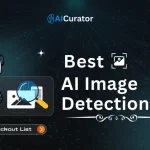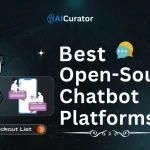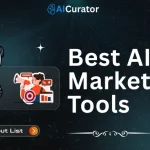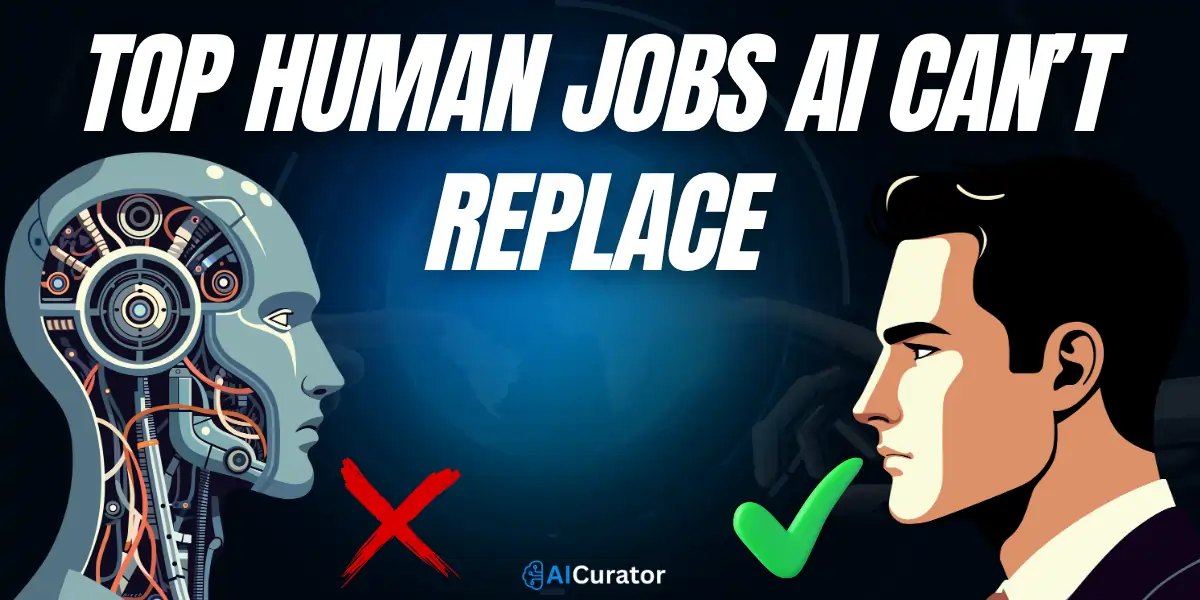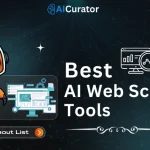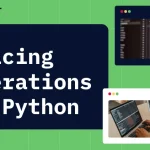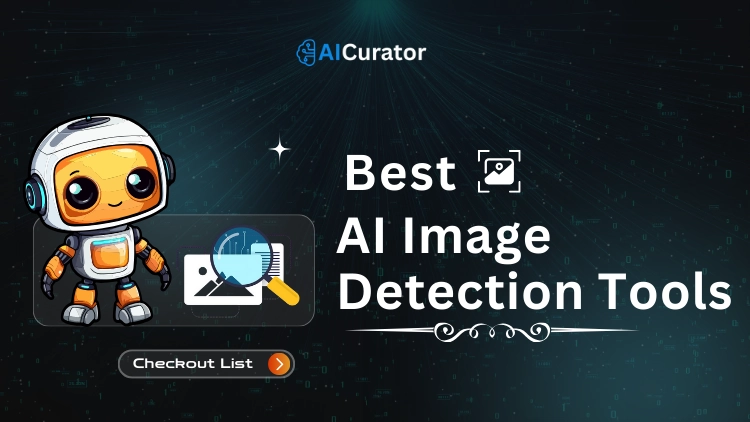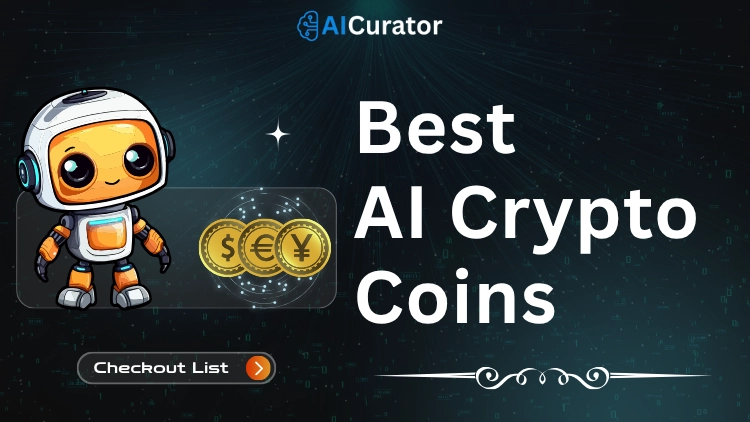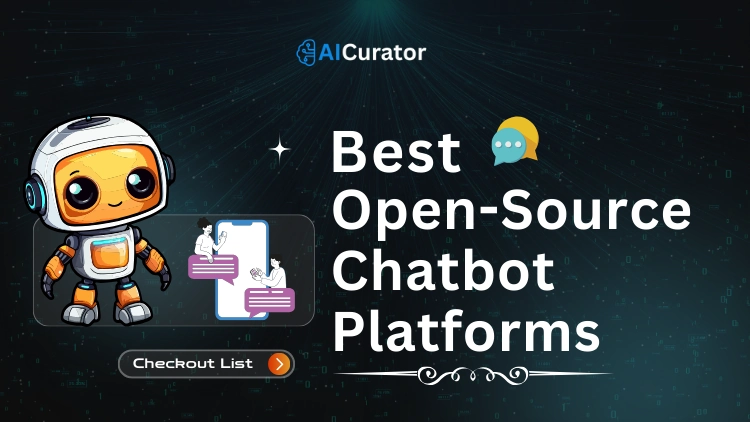The conversation around artificial intelligence often sparks a bit of fear, doesn't it? With headlines screaming about AI taking over, it's easy to worry about your job security. Some reports suggest that AI could affect hundreds of millions of jobs globally in the coming years.
But here’s the thing:
for all its power to process data, AI has its limits.
It can't replicate human creativity, empathy, or the critical thinking needed for complex decisions. This article will explore 12 professions where the human touch remains absolutely essential, proving that some jobs are here to stay.
Jobs AI Can't Replace: Essential Human-Centered Careers
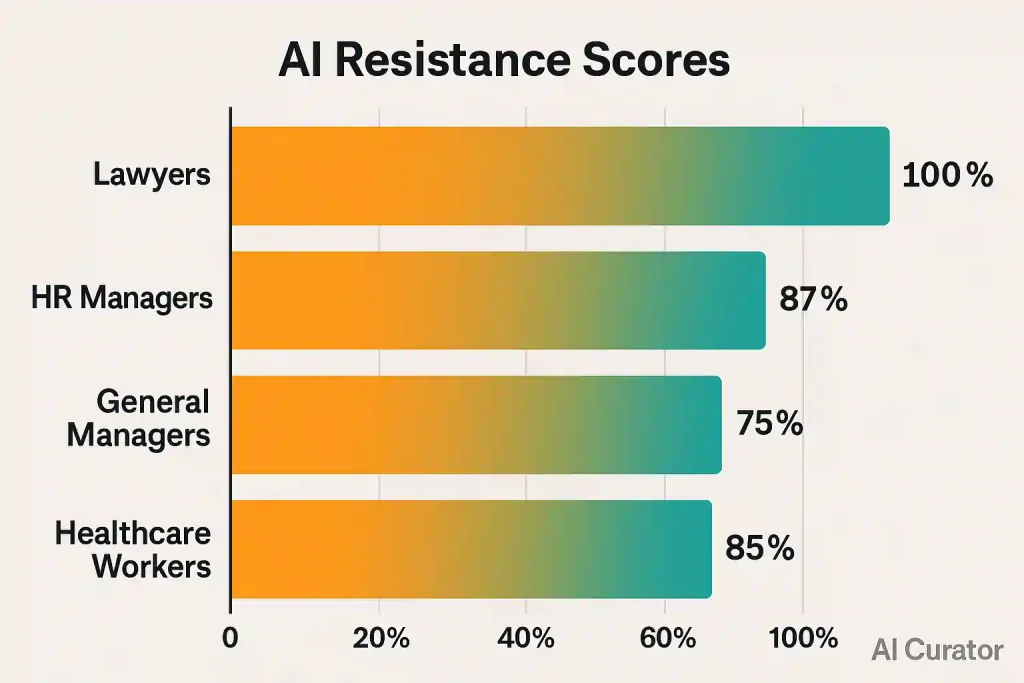
| Career Category | AI Resistance Level | Key Human Skills |
|---|---|---|
| Healthcare Professionals | Very High | Empathy, Critical Diagnosis, Patient Care |
| Counsellors & Therapists | Very High | Emotional Intelligence, Trust Building |
| Teachers & Educators | High | Mentoring, Adaptability, Inspiration |
| Creative Professionals | Very High | Imagination, Cultural Understanding |
| Skilled Tradespeople | High | Physical Dexterity, Problem-Solving |
| Managers & Leaders | High | Strategic Vision, Team Motivation |
| HR Professionals | Very High | Conflict Resolution, Culture Building |
| Lawyers & Judges | Very High | Ethical Judgment, Legal Reasoning |
| Social Workers | Very High | Community Support, Crisis Management |
| Scientists & Researchers | High | Hypothesis Formation, Creative Discovery |
| Emergency Responders | Very High | Split-Second Decisions, Physical Courage |
| Environmental Conservationists | High | Advocacy, Fieldwork, Community Relations |
1. Healthcare Professionals

Why it’s AI-Proof: Healthcare is fundamentally about human connection, empathy, and trust—qualities that AI systems cannot genuinely possess. Doctors, nurses, and surgeons make high-stakes decisions that often require a deep understanding of a patient's emotional state, lifestyle, and personal history.
While AI can analyse medical images or suggest potential diagnoses, it cannot replicate the compassionate care of a nurse holding a patient's hand or a doctor explaining a difficult diagnosis with sensitivity.
The industry has one of the lowest AI adoption rates, at just 15%, showing a clear reliance on human experts. Employment in healthcare is projected to grow significantly, adding about 2 million new jobs between 2021 and 2031.
How AI Will Help: Instead of replacing them, AI will become a powerful assistant for healthcare workers. It can handle repetitive administrative tasks like transcribing clinician notes or organising patient data, freeing up professionals to focus more on direct patient care.
2. Counsellors and Therapists
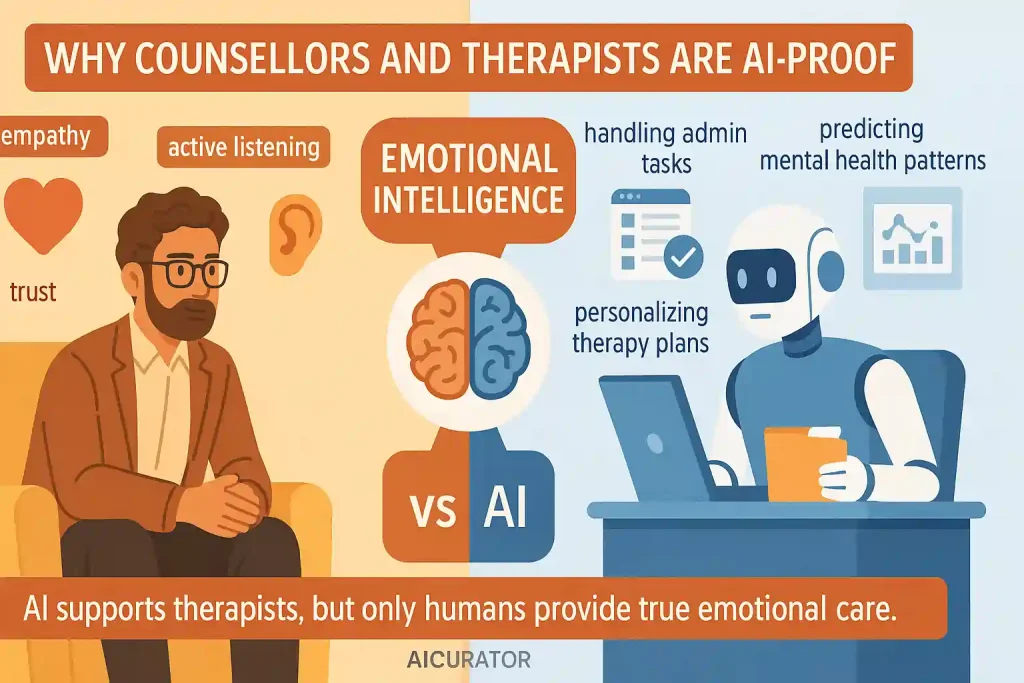
Why it’s AI-Proof: The fields of counselling and mental health support are built on a foundation of empathy, active listening, and the ability to build a trusting human relationship. A therapist’s job is to understand the complex web of human emotions, which AI struggles to truly comprehend.
While an AI chatbot might offer scripted advice or immediate support, it cannot provide the genuine connection and personalised guidance that a human counsellor offers. The ability to read body language, hear the unspoken words in a conversation, and adapt therapy to an individual's unique emotional needs makes this profession deeply human.
How AI Will Help: AI tools can assist therapists by handling administrative work, personalising therapy plans, or even helping to predict certain mental health disorders based on data patterns.
This allows human therapists to dedicate more of their time and energy to the core of their work: talking with and supporting their clients. The technology acts as a background support system, not the main practitioner.
3. Teachers and Educators
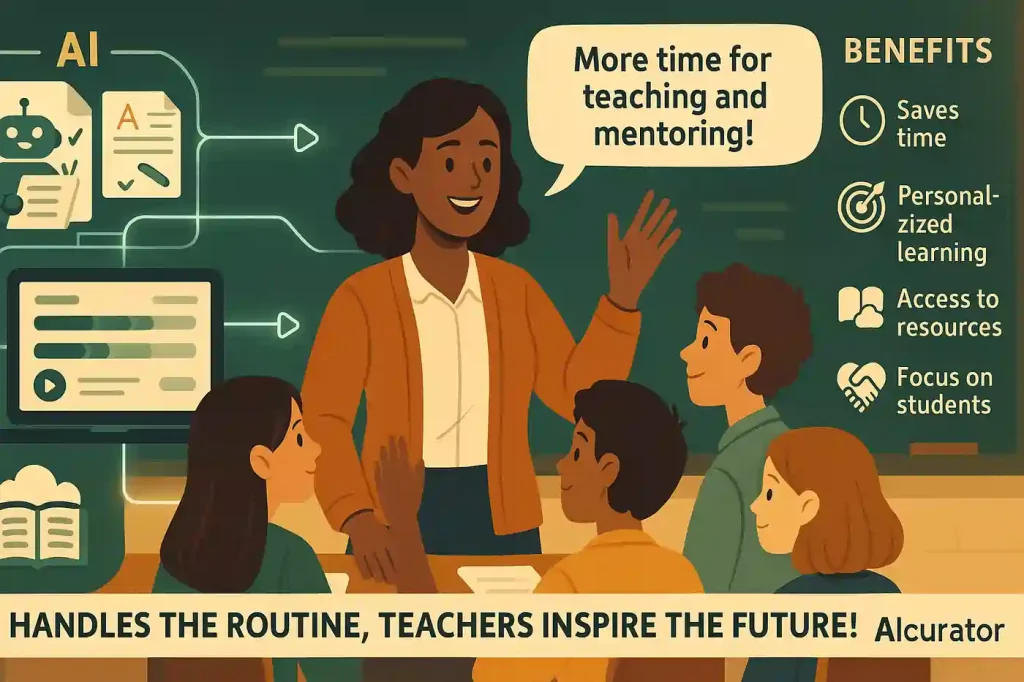
How AI Will Help: AI is set to become an educator's best friend. It can automate grading, create personalised learning paths for students, and provide access to vast amounts of information.
This frees up teachers from repetitive tasks, allowing them to focus on what they do best: mentoring and inspiring the next generation. The future of education is a classroom where technology assists a human teacher, not one where the teacher is a robot.
4. Creative Professionals
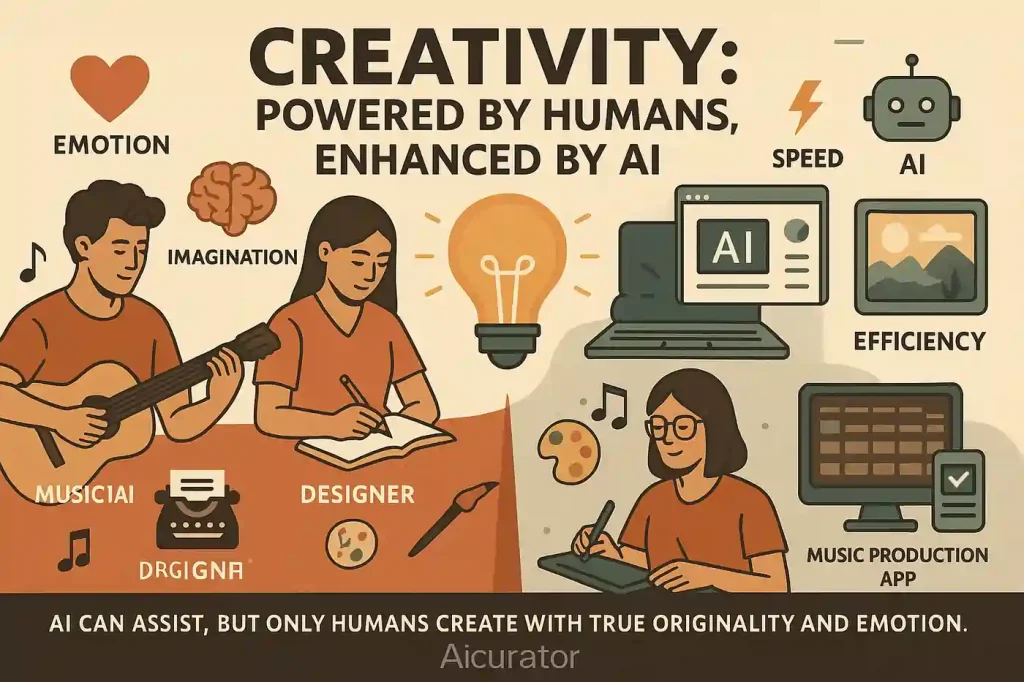
Why it’s AI-Proof: Creativity is one of the most difficult human traits for an AI to mimic. While AI can generate music, art, or text based on existing data, it lacks genuine imagination and personal experience.
A musician infuses a performance with raw emotion, a writer crafts a story with a unique human point of view, and a designer uses cultural understanding to create something truly original.
These creative acts come from a place of lived experience and intuition that algorithms simply do not have. The output from an AI is predictive, recombining elements it has already seen, whereas human creativity can produce something entirely new.
How AI Will Help: For creatives, AI is a powerful new tool in their toolkit. An artist can use an AI image generator to brainstorm ideas, a writer can use an AI assistant to check for grammatical errors, and a musician can use AI to create backing tracks.
The technology can handle some of the grunt work, giving creative professionals more time to focus on the artistic vision and emotional expression that makes their work unique.
5. Skilled Tradespeople
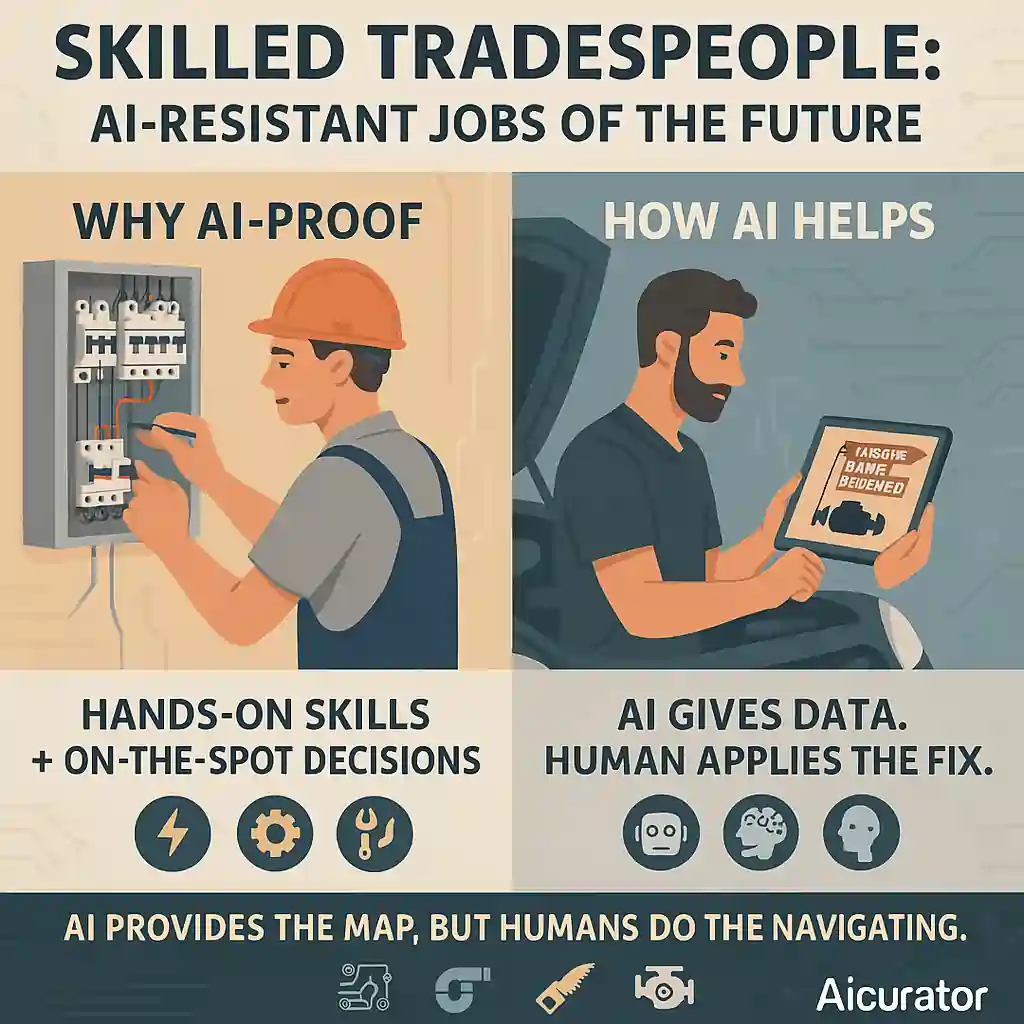
Why it’s AI-Proof: Jobs like electricians, plumbers, carpenters, and auto mechanics require a combination of physical dexterity, on-the-spot problem-solving, and adaptability that is far beyond the current capabilities of AI and robotics.
These professionals work in unpredictable, real-world environments where no two jobs are exactly alike. They need to diagnose issues with their hands, navigate tight spaces, and make quick decisions based on their practical experience—skills that are incredibly difficult to automate.
How AI Will Help: AI can certainly assist skilled tradespeople. For example, an auto mechanic might use AI-powered diagnostic tools to identify an engine problem faster, or a plumber could use an AI system to map out the most efficient pipe layout.
However, the physical work and the critical thinking required to apply that information remain firmly in human hands. AI provides the map, but the human does the navigating.
6. Managers and Leaders
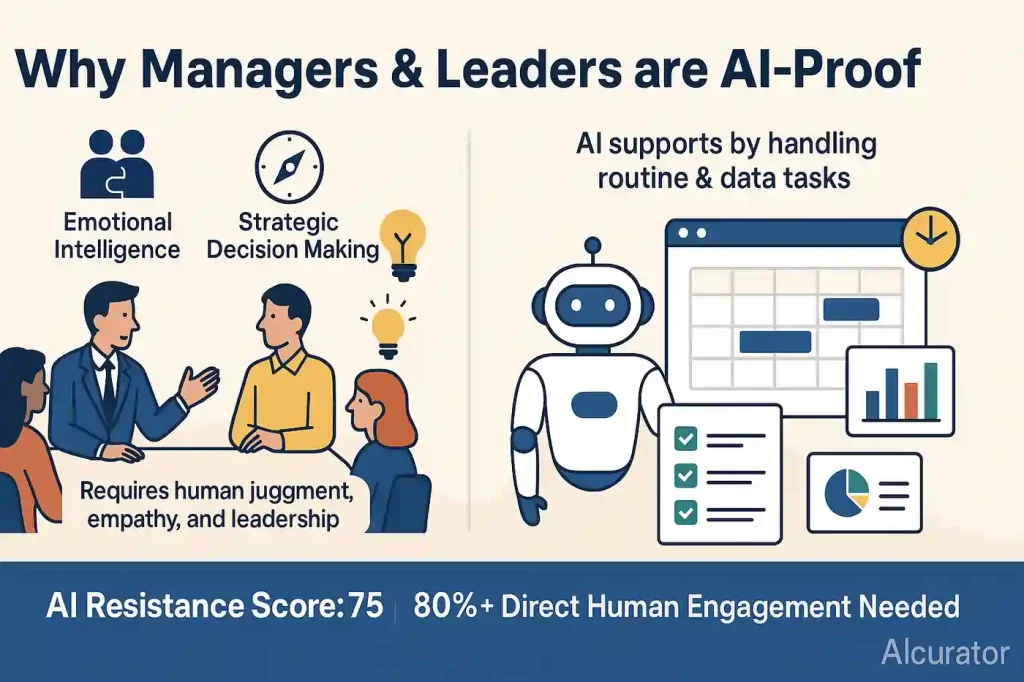
Why it’s AI-Proof: Effective leadership is about emotional intelligence, motivation, and strategic decision-making in complex situations. Managers need to weigh market trends, understand team dynamics, and make judgment calls that align with an organisation's values.
This requires a deep understanding of human behaviour and the ability to inspire and guide a team—skills that are inherently human. A report by Eskimoz gave general and operations managers an AI resistance score of 75, noting that the role requires over 80% direct engagement with employees.
How AI Will Help: AI can be a huge asset for managers by automating routine tasks like scheduling, data analysis, and report generation. This allows leaders to focus on higher-level activities like strategy, mentoring their team members, and fostering a positive company culture. AI can provide the data, but the leader provides the vision and the human touch needed to execute it.
7. Human Resources (HR) Professionals
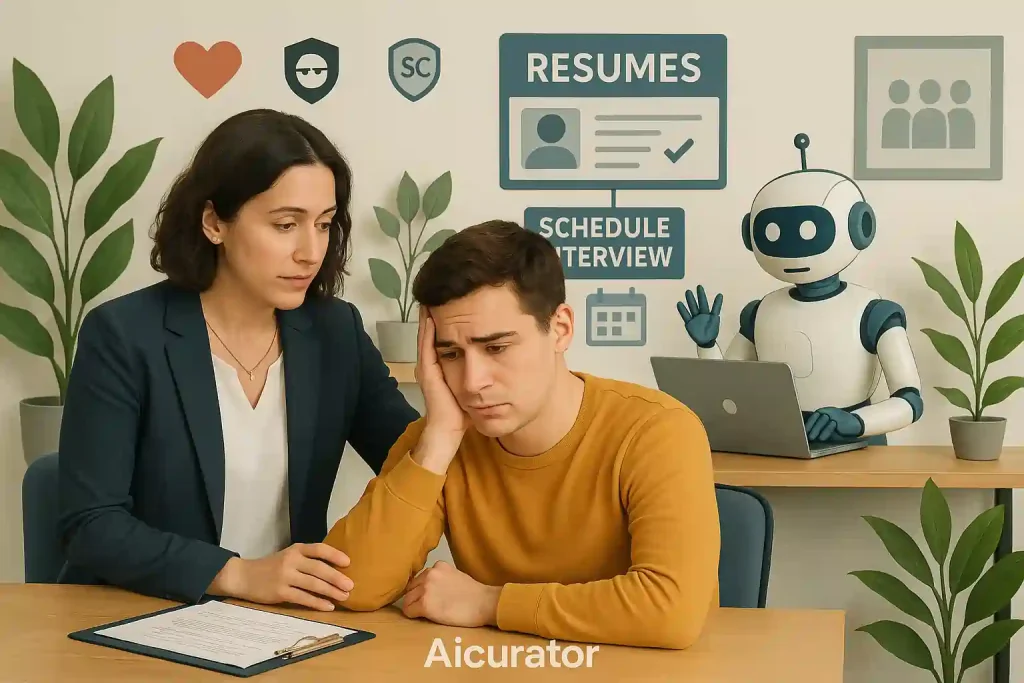
Why it’s AI-Proof: Human resources is another field that is fundamentally about people. HR professionals handle sensitive tasks like conflict resolution, employee well-being, and recruitment, all of which require empathy, discretion, and an understanding of complex human dynamics.
Making subjective judgments based on individual circumstances is a core part of the job. For this reason, HR managers have a high AI resistance score of 87, with a low automation probability of just 26%.
How AI Will Help: AI is already being used in HR to streamline certain processes. AI tools can filter job applications, schedule interviews, and handle routine administrative work. This automation frees up HR professionals to concentrate on the more human-centric parts of their job, such as building company culture, supporting employee development, and resolving interpersonal issues.
8. Lawyers and Judges
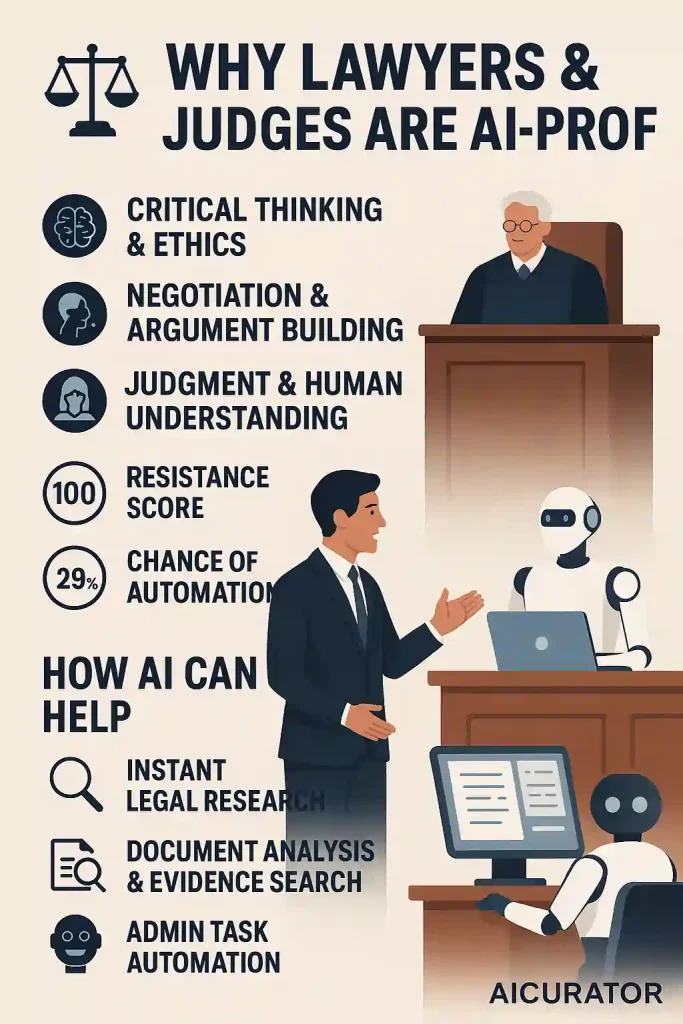
Why it’s AI-Proof: The legal profession requires a sophisticated level of critical thinking, ethical judgment, and interpretation of the law that AI cannot match. Lawyers must build arguments, negotiate settlements, and understand the subtle human elements of a case. Judges must weigh evidence, consider ethical implications, and make decisions that can change lives.
According to one study, lawyers top the list of AI-proof professions with a resistance score of 100 and only a 29% chance of being automated. While AI excels at processing data, it lacks the ability to make the kind of ethical and reasoned judgments that are central to the justice system.
How AI Will Help: AI is expected to become an invaluable assistant in the legal field. It can perform legal research in seconds, analyse vast amounts of documents for evidence, and handle repetitive administrative tasks. This will make legal services more efficient and accessible, but the core roles of advising clients, arguing in court, and making final judgments will remain with human professionals.
9. Social Workers
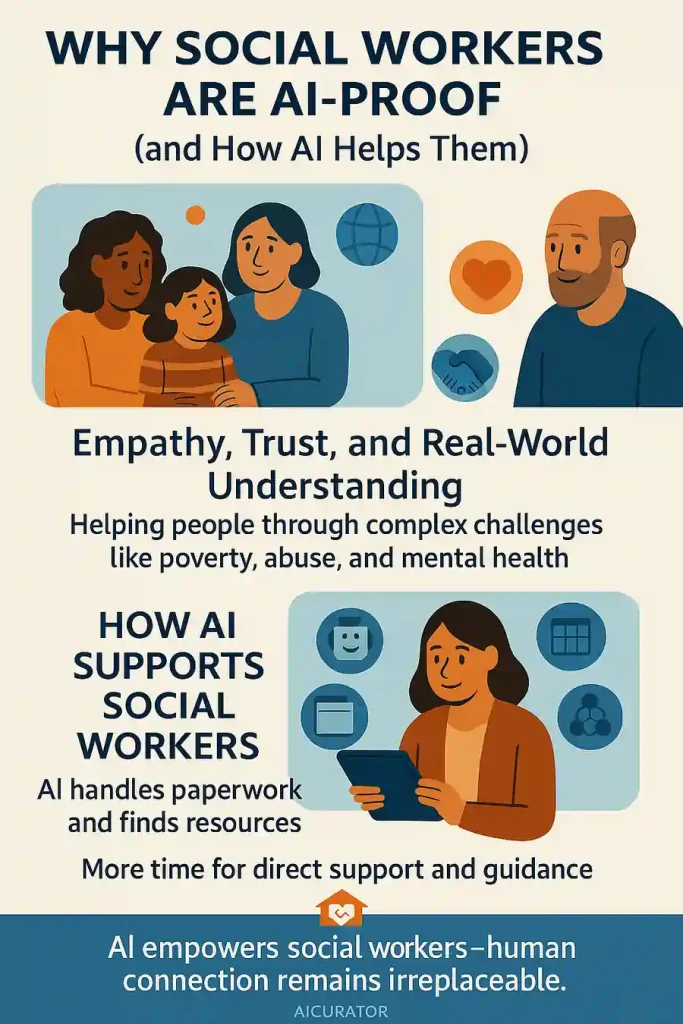
Why it’s AI-Proof: Social workers operate in complex and emotionally charged environments, helping individuals and families navigate challenges like poverty, abuse, and mental health issues.
This work demands deep empathy, cultural sensitivity, and the ability to build trust with vulnerable people. AI lacks the emotional intelligence and real-world understanding needed to navigate these delicate social dynamics and provide meaningful support.
How AI Will Help: AI can support social workers by managing case files, identifying available community resources, and automating paperwork. This would allow social workers to spend more time in the field, providing direct emotional support and guidance to those who need it most.
10. Scientists and Researchers
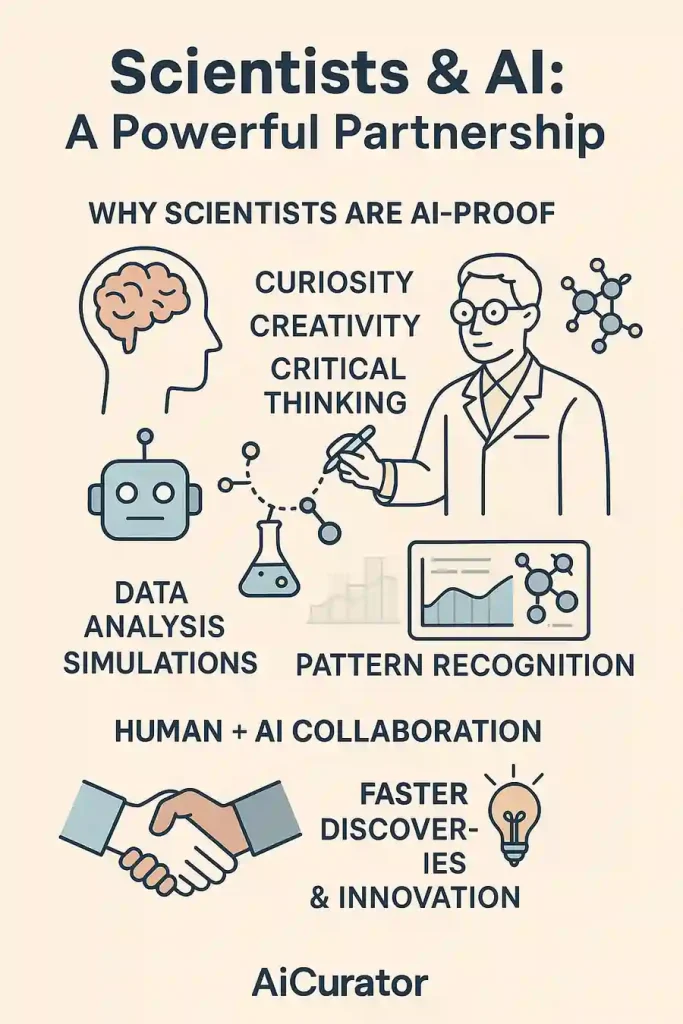
Why it’s AI-Proof: Scientific discovery is driven by human curiosity, creativity, and intuition. While AI is incredibly powerful at processing and analysing massive datasets, it's the human scientist who formulates the hypothesis, designs the experiment, and interprets the results in a meaningful way.
Groundbreaking discoveries often come from thinking outside the box and connecting disparate ideas—a uniquely human skill. The critical thinking and domain knowledge required to derive new insights will keep scientists firmly in control of the research process.
How AI Will Help: AI is a dream tool for scientists. It can accelerate research by analysing data at a speed no human could ever achieve, running complex simulations, and identifying patterns that could lead to new discoveries. This human-AI collaboration will likely speed up the pace of innovation across all scientific fields.
11. Emergency Responders
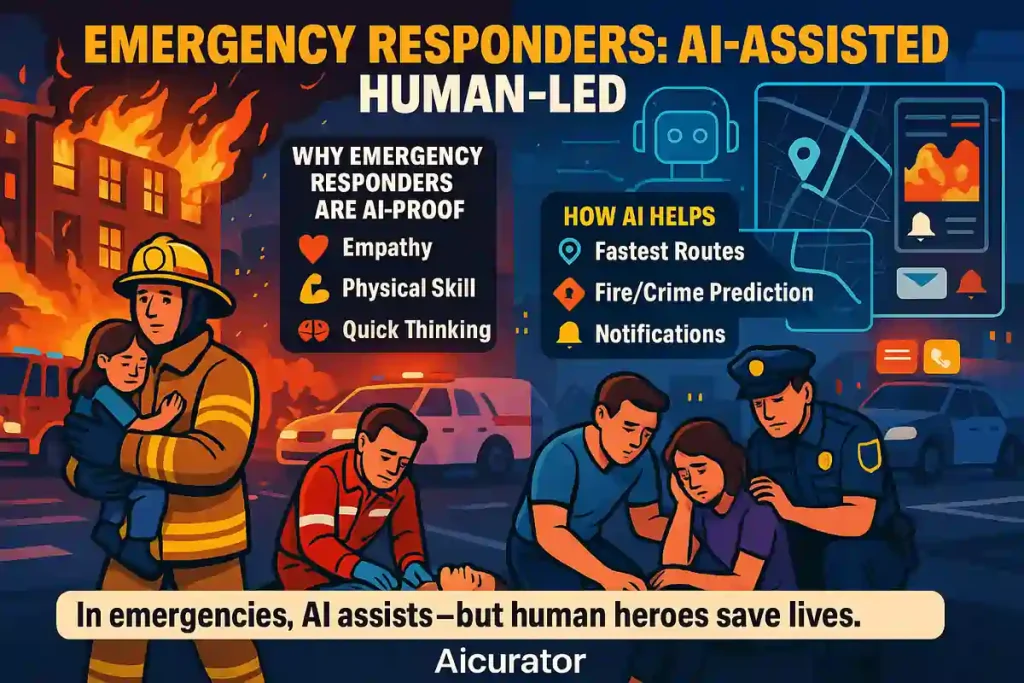
Why it’s AI-Proof: Firefighters, paramedics, and police officers work in high-stakes, unpredictable situations where quick thinking and physical skill are essential. These jobs require courage, calm under pressure, and the ability to make life-or-death decisions in a split second.
The empathy needed to comfort someone in a crisis and the physical ability to perform a rescue are things that machines are not equipped to handle.
How AI Will Help: AI can be used to improve emergency response. For example, it can predict where fires are most likely to break out, find the fastest route to an emergency, or analyse crime data to identify patterns. However, when it comes to running into a burning building or providing immediate medical care, a human presence is irreplaceable.
12. Environmental Conservationists
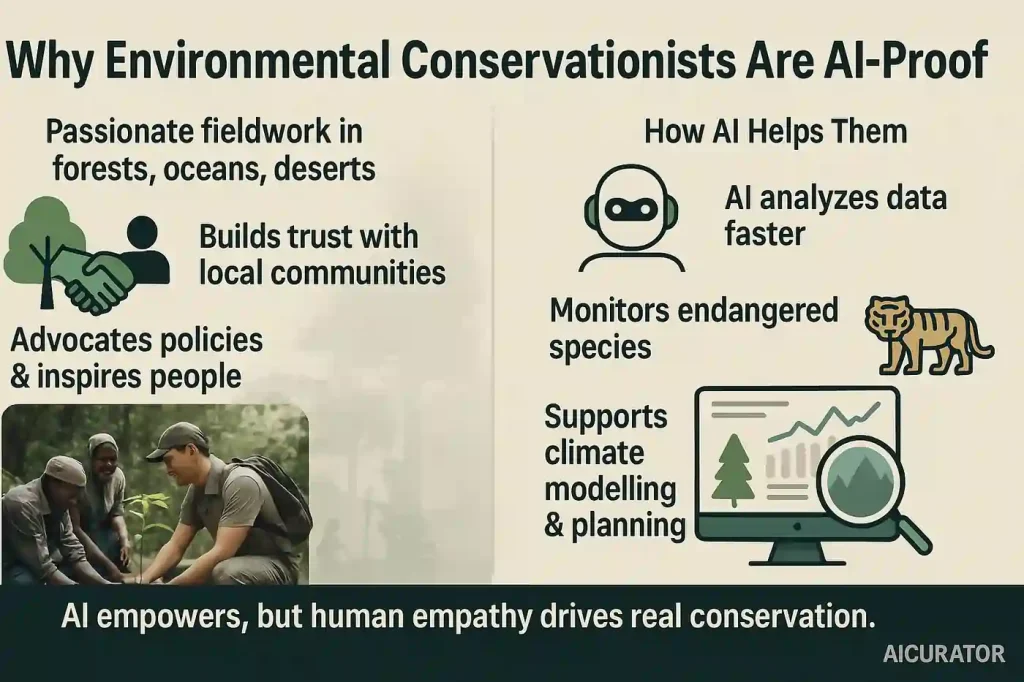
Why it’s AI-Proof: Protecting our planet requires a passion and dedication that AI cannot replicate. Environmental conservationists often do hands-on fieldwork in remote and challenging environments.
Their work also involves building relationships with local communities, advocating for policy changes, and motivating others to take action. These tasks rely heavily on human qualities like empathy, trust-building, and passionate communication.
How AI Will Help: AI tools can greatly enhance conservation efforts. They can be used to monitor deforestation through satellite imagery, track endangered species, and model the effects of climate change. This provides conservationists with powerful data to support their work, but the on-the-ground action and advocacy will always require a human touch.
The Human Advantage: Jobs and Skills AI Can’t Replace
The rise of AI isn't signalling the end of human work; it's heralding a shift in the skills that are most valued. While AI will automate many repetitive and data-heavy tasks, it will also create new job opportunities and allow professionals to focus on the parts of their jobs that are uniquely human. The future of work is not a battle of humans versus machines, but a partnership.
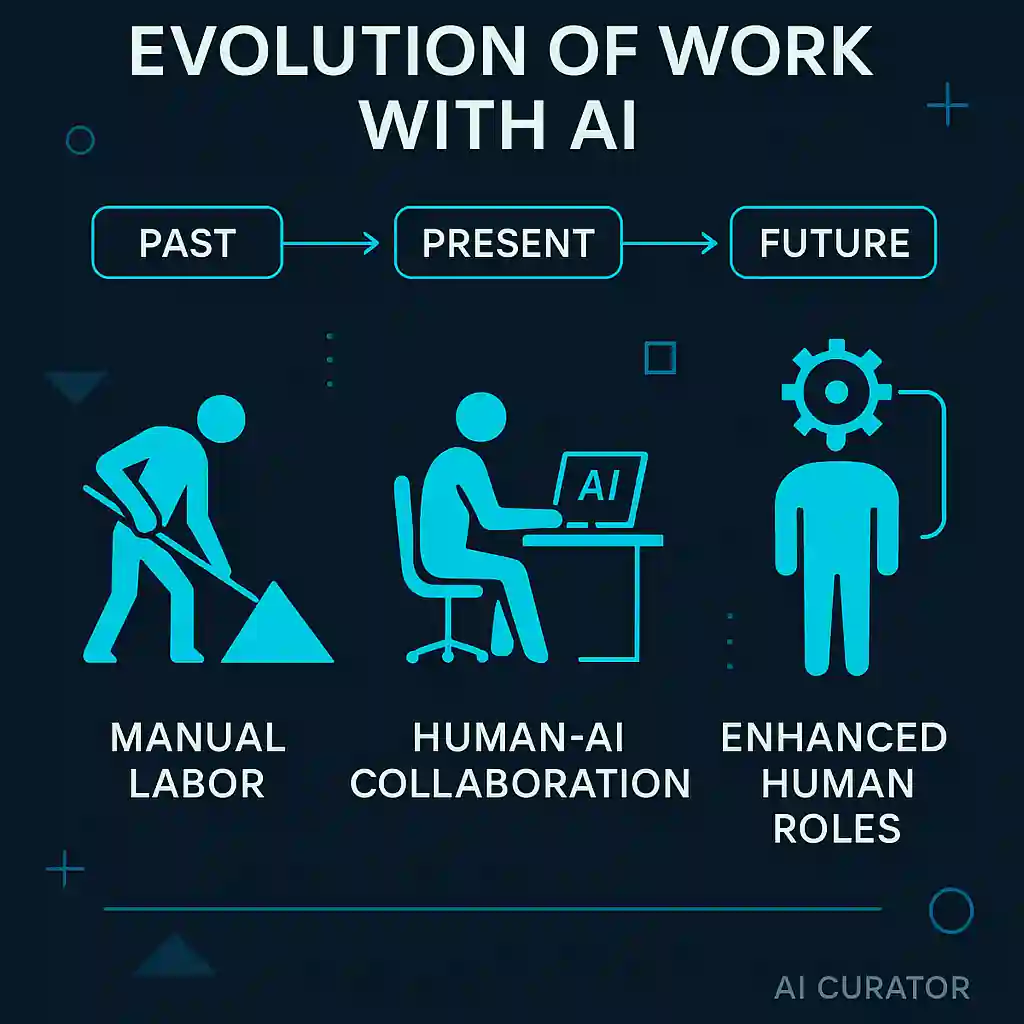
The careers that will thrive are those that rely on creativity, emotional intelligence, critical thinking, and genuine human connection. By focusing on developing these irreplaceable skills, we can ensure our place in an increasingly automated world.


